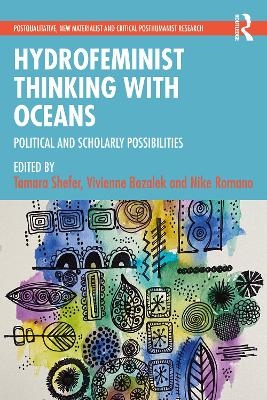
Hydrofeminist Thinking With Oceans
Routledge (Verlag)
978-1-032-40899-6 (ISBN)
Hydrofeminist Thinking with Oceans brings together authors who are thinking in, with and through the spaces of ocean/s and beaches in South African contexts to make alternative knowledges towards a justice-to-come and flourishing at a planetary level. Primary scholarly locations for this work include feminist new materialist and post-humanist thinking, and specifically locates itself within hydrofeminist thinking.
Together with a foreword by Astrida Neimanis, the chapters in this book explore both land and water with oceans as powerfully political spaces, globally and locally entangled in the violences of settler colonialism, land dispossession, slavery, transnational labour exploitation, extractivism and omnicides. South Africa is a productive space to engage in such scholarship. While there is a growing body of literature that works within and across disciplines on the sea and bodies of water to think critically about the damages of centuries of colonisation and continued extractivist capitalism, there remains little work that explores this burgeoning thinking in global Southern, and more particularly South African contexts. South African histories of colonisation, slavery and more recently apartheid, which are saturated in the oceans, are only recently being explored through oceanic logics. This volume offers valuable Southern contributions and rich situated narratives to such hydrofeminist thinking. It also brings diverse and more marginal knowledges to bear on the project of generating imaginative alternatives to hegemonic colonial and patriarchal logics in the academy and elsewhere. While primarily located in a South African context, the volume speaks well to globalised concerns for justice and environmental challenges both in human societies and in relation to other species and planetary crises.
The chapters, which will be of interest to scholars, activists and other civil society stakeholders, share inspiring, rich examples of diverse scholarship, activism and art in these contexts, extending international scholarship that thinks in/on/with ocean/s, littoral zones and bodies of water. The book offers ethico-political perspectives on the role of research in ocean governance, policy development and collective decision-making for ecological justice. This book is suitable for students and scholars of post-qualitative, feminist, new materialist, embodied, arts-based and hydrofeminist methods in education, environmental humanities and the social sciences.
Tamara Shefer is Professor of Women’s and Gender Studies, Faculty of Arts and Humanities, University of the Western Cape, Cape Town, South Africa. She primarily writes about young people, gender and sexualities. She currently focuses on post-qualitative, feminist, decolonial scholarship, including thinking with oceans for alternative knowledge and ethical living. Vivienne Bozalek is Emerita Professor of Women’s and Gender Studies, Faculty of Arts and Humanities, University of the Western Cape, Cape Town, South Africa, and an Honorary Professor at the Centre for Higher Education Research, Teaching and Learning (CHERTL) at Rhodes University, Grahamstown, South Africa. She currently focuses on post-qualitative feminist, new materialist and post-humanist scholarship. Nike Romano teaches history and theory of design at the Cape Peninsula University of Technology, Cape Town, South Africa. Her artistic research interests explore the relationship between thinking, making and doing through a post-humanist and feminist new materialist frame.
Introduction to the series Simone Fullagar Foreword: Hydrofeminisms and the desire for a watery “we” Astrida Neimanis Ocean Home Toni Giselle Stuart 1. Chapter 1: Hydrofeminist scholarship and activisms in/on/with South African oceans and shores Tamara Shefer, Vivienne Bozalek and Nike Romano 2. Chapter 2: When ancestors are included in ocean decision- and meaning-making Dylan McGarry 3. Chapter 3: Collaborative innovations into pedagogies of care for South African hydrocommons Aaniyah Martin 4. Chapter 4: Surfing as a space for activism and change: What could surfing be(come)? Karen Graaff 5. Chapter 5: Mobilising more-than-human aesthetics: Becoming octopus as pedagogical praxis Delphi Carstens and Mer Maggie Roberts 6. Chapter 6: Restless remains and untimely returns: On walking and wading Adrienne van Eeden-Wharton 7. Chapter 7: Indian Ocean sea beans: Affective methods in museum archives Kristy Stone 8. Chapter 8: Life and death in an ancient sea Zayaan Khan 9. Chapter 9: Relational bodies of memory, time and place: Hauntings in salty Camissa waters Joanne Peers 10. Chapter 10: Oceanic swimming-writing-thinking for justice-to-come scholarship Tamara Shefer, Vivienne Bozalek and Nike Romano 11. Chapter 11: Diffracting forests: Making home in a (post)apartheid city Barry Lewis 12. Chapter 12: Grandmothers of the sea: Stories and lessons from five Xhosa ocean elders Buhle Francis and Dylan McGarry 13. Re-imagining troubled spaces of academia while thinking with and through oceans: Black feet white sand Cheri Hugo Afterword: Between spin and drift, or overviews and undercurrents Meghan Judge
| Erscheinungsdatum | 21.12.2023 |
|---|---|
| Reihe/Serie | Postqualitative, New Materialist and Critical Posthumanist Research |
| Zusatzinfo | 66 Halftones, black and white; 66 Illustrations, black and white |
| Verlagsort | London |
| Sprache | englisch |
| Maße | 156 x 234 mm |
| Gewicht | 120 g |
| Themenwelt | Naturwissenschaften ► Geowissenschaften ► Geografie / Kartografie |
| Naturwissenschaften ► Geowissenschaften ► Hydrologie / Ozeanografie | |
| Sozialwissenschaften ► Soziologie ► Gender Studies | |
| Sozialwissenschaften ► Soziologie ► Spezielle Soziologien | |
| Technik ► Umwelttechnik / Biotechnologie | |
| ISBN-10 | 1-032-40899-5 / 1032408995 |
| ISBN-13 | 978-1-032-40899-6 / 9781032408996 |
| Zustand | Neuware |
| Informationen gemäß Produktsicherheitsverordnung (GPSR) | |
| Haben Sie eine Frage zum Produkt? |
aus dem Bereich


